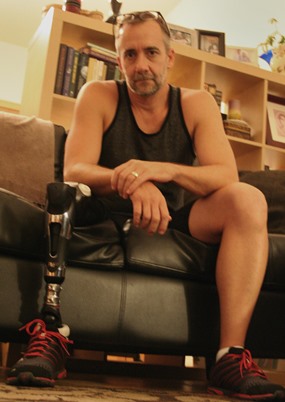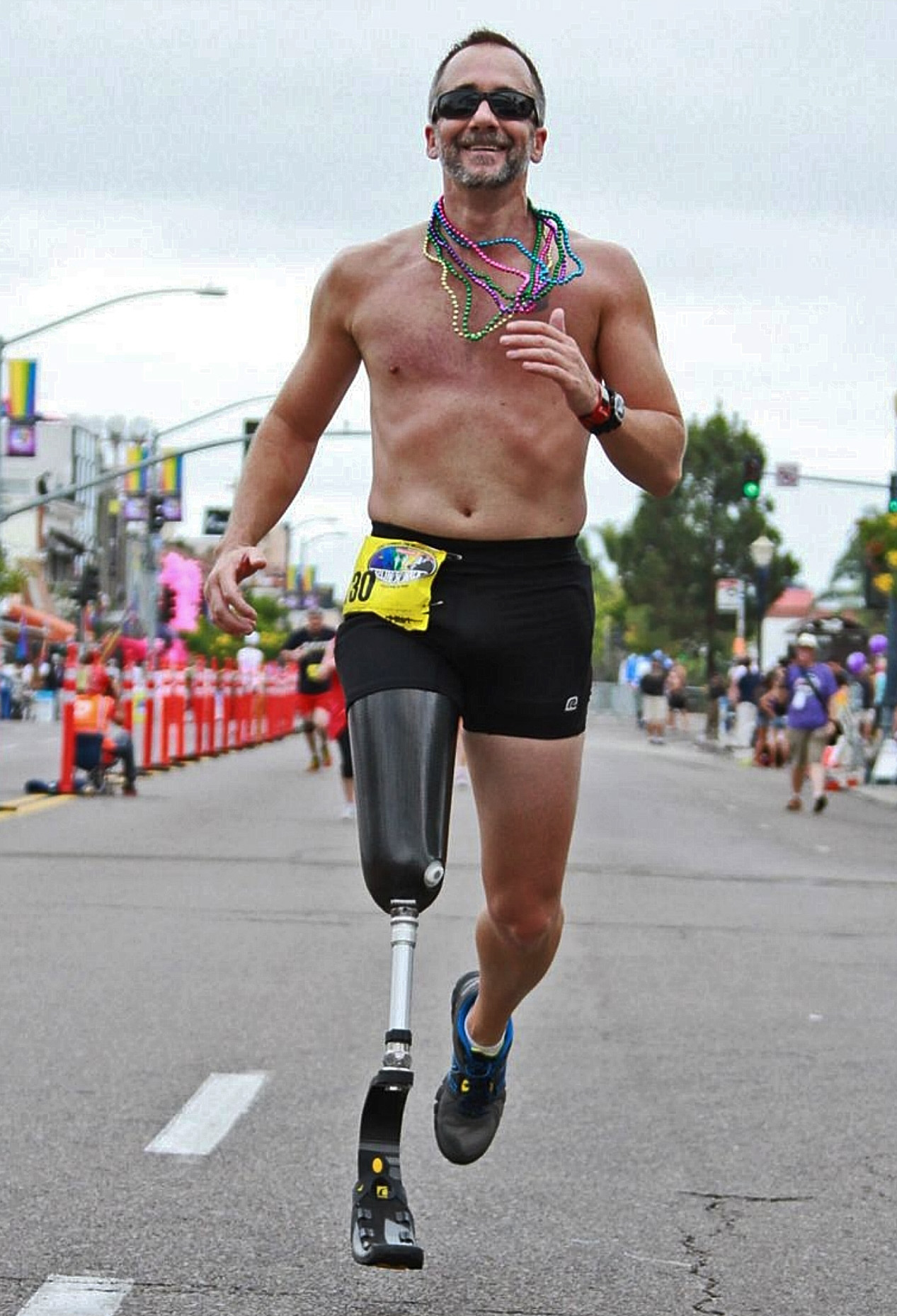Click here to watch the TEDTalk that inspired this post.
As a man missing a leg, what interests me about this TEDWeekend's Idea Worth Spreading is the novel notion that what might be an impediment to mobility need not be an impediment to beauty or even sexiness -- not in Aimee Mullins' case anyway. People like Mullins, Amy Purdy, Alex Minsky, Chris Van Etten and amputees the world over prove every day that functional bodies are hot, even if they function differently.
When I lost my leg to cancer three years ago, I was already middle-aged, already gray and already softer than my once youthful self. Today, I'm almost 49, and I don't feel less attractive just because I'm an amputee. In fact, I feel a bit better about myself than I did three years ago and not just because I'm healthier.

I like my new body. What I like best about it is the high-tech, sleek, hot hunk of chrome that works so much better than the old, withered, cancerous shank they cut off (and I'd be shamefully remiss if I didn't thank the geniuses at Freedom Innovations for the elegance and utility of their design).
With my leg on, I'm complete. I'm mobile, functional, sturdy, confident and bipedal, just the way nature wants me to be. But nature alone won't give me all those things. Nature gave me cancer. Engineering gave me a leg. I love how it works, how it looks and the attention it draws.
I live in San Diego and get to wear shorts practically year-round, which is a good thing for me. In a pair of long pants I'm just a guy with a limp. But with my leg on display, I look like a kick-ass cyborg menace. Of course, I'm not. I'm still a one-legged guy. Push me, and I'll fall over. But people are generally interested in how I look because I look so unlike the norm.
If that was the extent of it, I'd be little more than a sideshow exhibit, and that's precisely what an amputee does not want to be.
Unlike the bearded ladies and dog-faced boys of yore, I don't get stares, gaping mouths or pointing and pitiful looks. Instead, I get affirming head nods and grins and even the occasional salute. I don't think that's because I'm an amputee. I think it's because I'm an amputee who gets around and does things like a non-amputee. While I'm grateful for the validation, that's not really fair.
Most amputees in America suffer from a debilitating disease. They aren't out running around on carbon fiber blades. They're fighting the lingering ravages of trauma, myriad illnesses and congenital conditions trying to kill them. They deserve no less acknowledgment than I get. And, of course, most people living with disabilities are not missing a limb. Some are gripped by scourges like cerebral palsy and ALS, others suffered spinal cord injuries, still others are limited by loss of sight or hearing, and far too many are beset by crushing mental illness that the world still tries harder to avoid than to cure.

I get cheered and other people get overlooked. When compared to someone who is runway gorgeous and a world-class athlete with a spectacular body, even I get overlooked (and rightly so).
There's no denying that Aimee Mullins is beautiful, but would Alexander McQueen have commissioned a pair of designer legs for her if she wasn't? Designers, photographers, publishers, producers and directors everywhere love beautiful people. The fact that Aimee Mullins is beautiful, an amazing athlete and an amputee makes her special. She's totally unlike the garden variety beauty that festoons the check-out aisles.
In the end, aside from genuine admiration of Aimee Mullins as an athlete and a spokesperson, what I take from the Idea Worth Sharing is this: beauty ranks highly enough on our table of social values to trump even disability.
We esteem nothing as highly as appearance, and, in a society that judges on the most superficial terms, finding a woman beautiful in fake legs is not growth; it's logic.
The key message is that beauty in its own right is such a strong advantage it outranks questions of mobility, utility, function or even inherent worth. We who are inspired by Aimee Mullins are moved by her accomplishments, her attitude and her bearing as much as anything else. But would we ever have noticed her if she didn't look like that? How many unattractive double-amputee athletes can you name? How many remarkable people with disabilities will never make a magazine cover? Where does courage leave off and the privilege of good looks take over?
It's no secret that beauty is an advantage, whether or not you're missing a limb or two. There are nearly two million people living with limb loss in this country. Very few of them will ever be known for their sex appeal. To that extent, we amputees are no different from the rest of you. Good looking amputees have advantages over their less good looking peers. That much, at least, is pretty clear.
As for whether or not it's fair, I suppose that's another topic for another time.
Author's note: I am grateful to Challenged Athletes Foundation for the gift of an Ӧssur Flex-Run foot, to Peter Harsch Prosthetics for building my running leg, to SCOPe Orthotics and Prosthetics for building my every-day leg, and to the Amputee Coalition of America for their tireless advocacy and support on behalf of amputees throughout the country.
We want to know what you think. Join the discussion by posting a comment below or tweeting #TEDWeekends. Interested in blogging for a future edition of TED Weekends? Email us at tedweekends@huffingtonpost.com.
